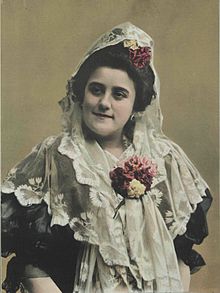Rosario Pino (1870-1933) was a bike pioneer in Spain at the end of the 19th century. She worked as actress and first appeared in a painting in the magazine El deporte velocipédico (The Velocipede Sport, a velocipede was a type of 19th-bicycle) in February 1896. At that time, bicycles were expensive devices that only high-class people, mainly men, could afford it.
Her image represented a terrible blow to the macho and patriarchal mentality since they claimed against women in trousers on infernal machines. The very same magazine published where Rosario appeared also showed a journal article in which the French doctor Lèon Petit explained a positive view of women riding bikes. For instance, he denied the absurd legends of relating women infertility, hirsutism and lack of sexual desire to bicycle. To the contrary, he approved women on bikes in order for them to enjoy a healthy life which in turn will contribute to bring more babies to the world.
The provocative picture of Rosario Pino boosted the Spanish women to use bicycles and is considered part of the fight for female civil rights. In fact, Susan B. Anthony, the American Suffragist Association president, affirmed “I think [the bicycle] has done more to emancipate women than any one thing in the world. I rejoice every time I see a woman ride by on a bike. It gives her a feeling of self-reliance and independence the moment she takes her seat; and away she goes, the picture of untrammelled womanhood”. Bicycles are symbols of equality because if men could make bike rides, women also could. For example, Marthe Hesse ascended the mythic Tourmalet mountain, France, without setting foot on the ground in 1902. Moreover, there were female bike competitions in Buffalo, Paris, Aix-les-Bains (France), Manchester (England) or Glasgow (Scotland). Female racers used the bloomers trousers, by Amelia Bloomer. In Spain, the first female bike race took place in 1935. The Ventas Cyclist Club organized the 22 kilometers race and Angelita Torres won it.
However, Rosario Pino rode in a relaxing way to go to wherever she wanted without the help of a man. She rode to the end of her days.
